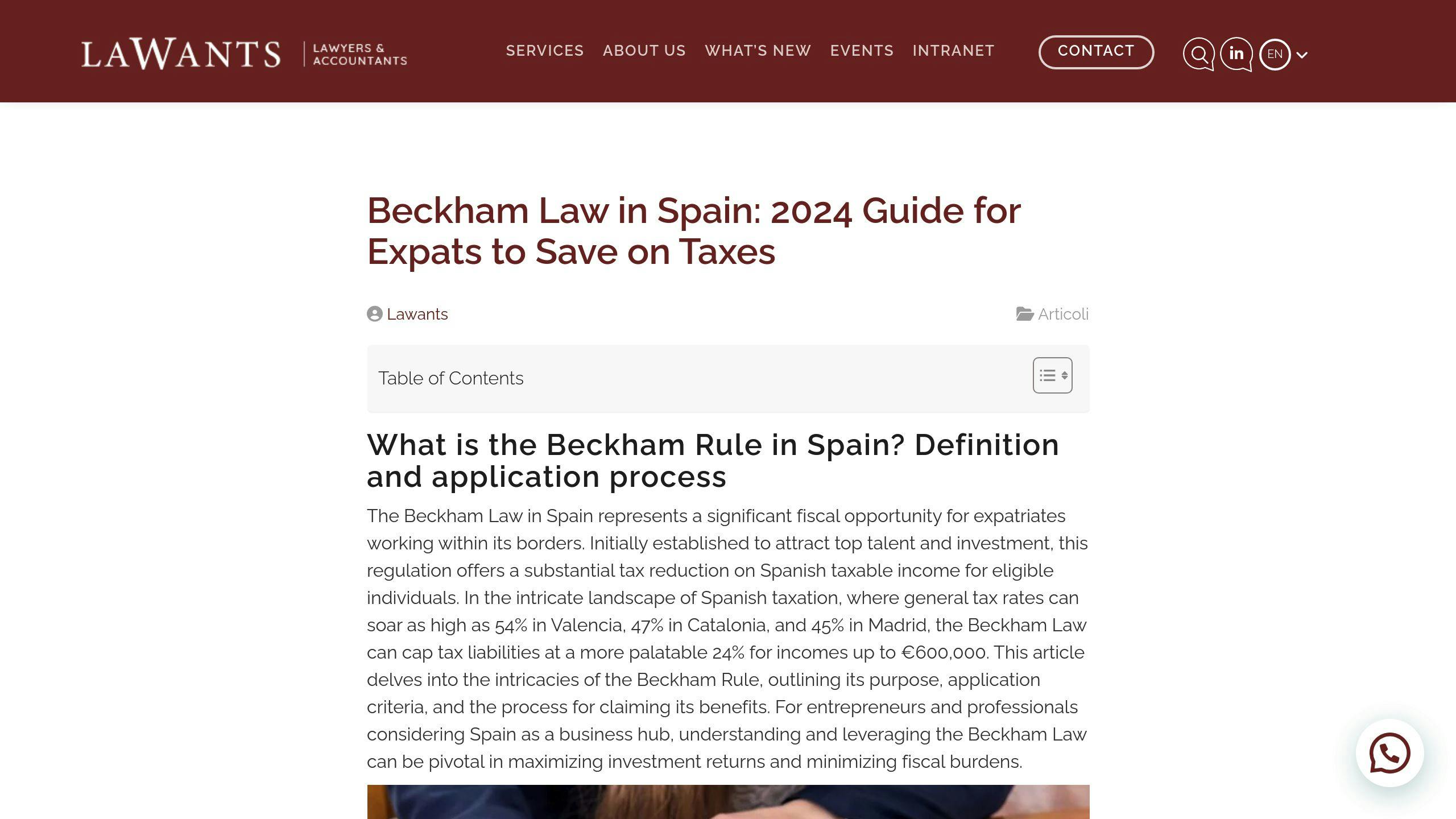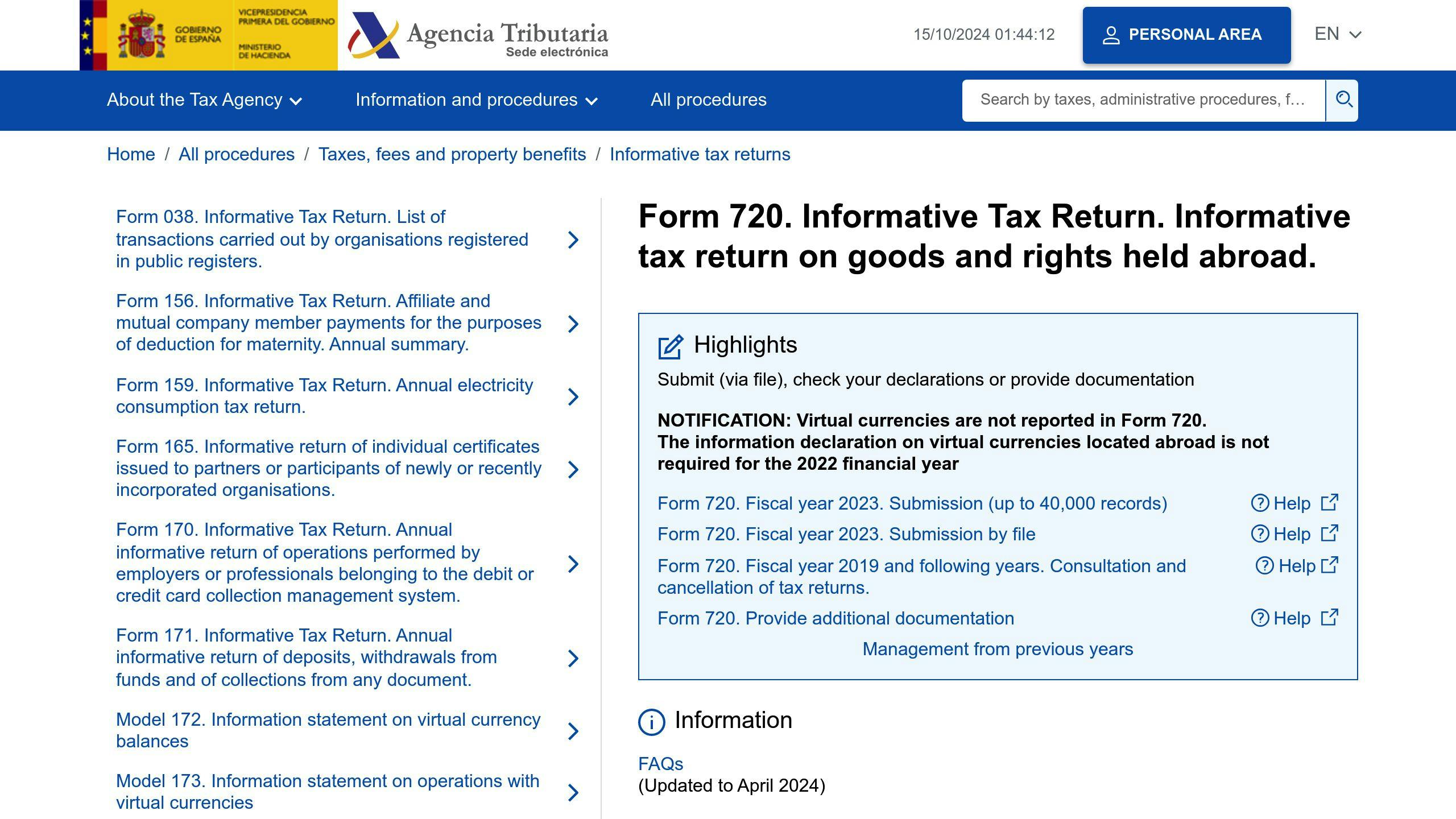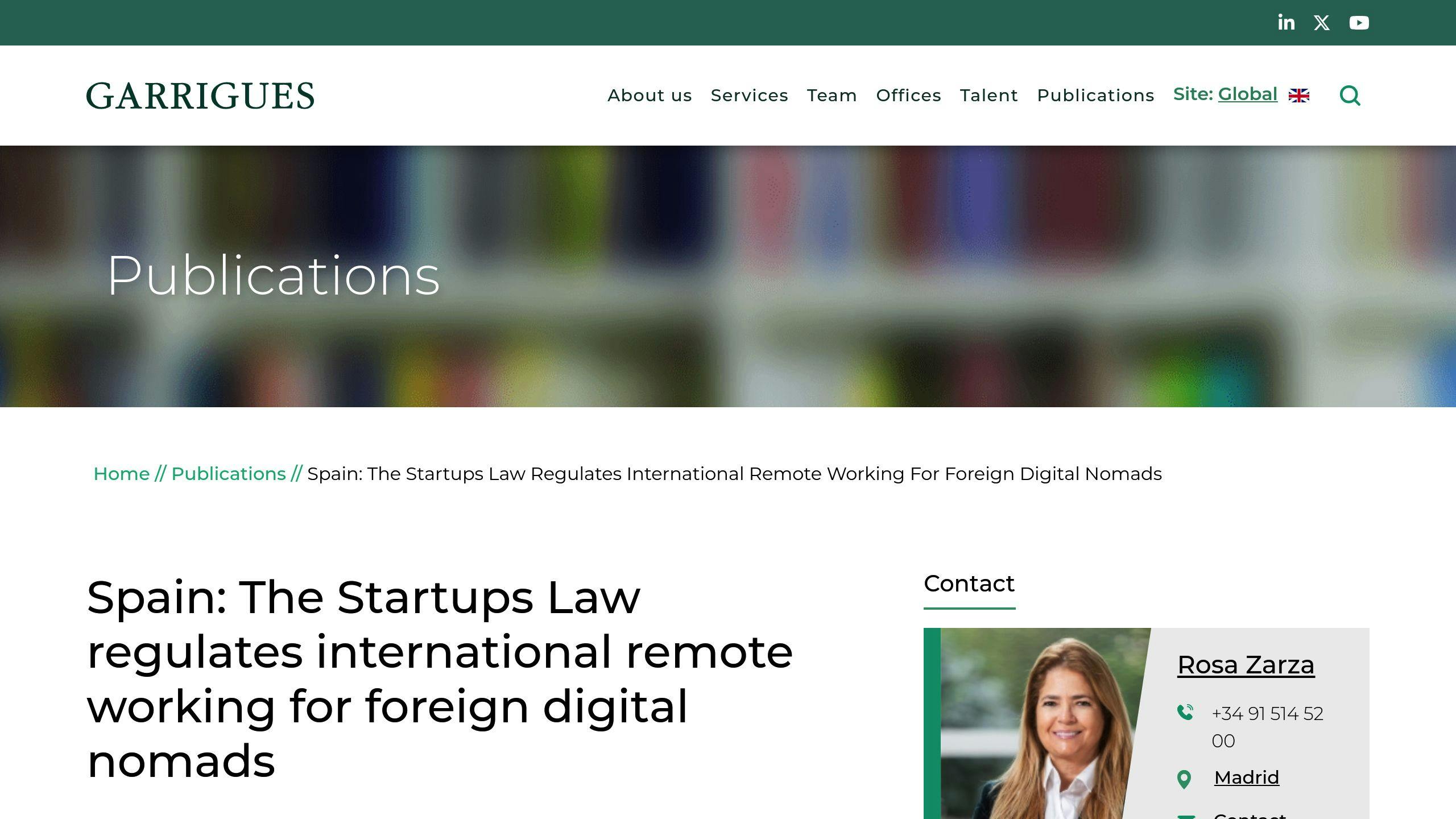Here's a quick guide to navigating taxes in Spain as an expat:
- Residency matters: Stay 183+ days/year? You're a tax resident.
- Tax rates: Residents pay 19-47% on worldwide income. Non-residents pay 24% flat rate on Spanish income.
- Key dates: File by June 30th (residents) or December 31st (non-residents).
- Foreign assets: Report if over €50,000 (Form 720).
- Beckham Law: New arrivals may qualify for 24% flat tax.
| Tax Type | Residents | Non-Residents |
|---|---|---|
| Income | 19-47% (progressive) | 24% flat rate |
| Wealth | 0.2-3.5% on assets >€700k | Only on Spanish assets |
| Property | 0.4-1.3% of cadastral value | Same as residents |
Pro tip: Spain's tax system is complex. Consider hiring a local tax expert to avoid costly mistakes.
Related video from YouTube
Tax Residency in Spain
Figuring out your tax residency in Spain can be confusing. Here's what you need to know:
Qualifying as a Tax Resident
You're a tax resident in Spain if you:
- Spend over 183 days in Spain in a calendar year
- Have your main economic interests in Spain
- Your spouse or dependent kids live in Spain full-time
Important: Even partial days count towards the 183-day rule. Keep a close eye on your time in Spain.
Resident vs. Non-Resident Taxes
The big difference? Tax residents pay taxes on ALL their income, worldwide. Non-residents only pay on Spanish income.
| Tax Resident | Non-Resident |
|---|---|
| Worldwide income taxed | Only Spanish income taxed |
| Progressive tax rates | Flat 24% tax rate |
| Can claim deductions | No deductions |
| Must file annual return | May not need to file |
Getting a Tax Residency Certificate
Need to prove your tax status? You'll need a Tax Resident Certificate. Here's how:
1. Get a NIE from the local police or consulate
2. Register with local authorities
3. Apply at your local tax office
This certificate usually lasts a year. You might need to renew it annually.
"A day during any part of which, however brief, the taxpayer is present in a State counts as a day of presence in that State for purposes of computing the 183 day period." - OECD Model Convention
Still not sure about your tax status? Talk to a Spanish tax expert. They can help you navigate the system and stay compliant.
Income Tax for Expats
Spain's tax system for expats varies based on residency status. Here's what you need to know:
Personal Income Tax for Residents
Tax residents in Spain pay on worldwide income. Rates increase with income:
| Income (EUR) | Tax Rate |
|---|---|
| 0 - 12,450 | 19% |
| 12,450 - 20,200 | 24% |
| 20,200 - 35,200 | 30% |
| 35,200 - 60,000 | 37% |
| 60,000 - 300,000 | 45% |
| Over 300,000 | 47% |
For a €25,000 annual income:
- 19% on first €20,000 = €3,800
- 24% on remaining €5,000 = €1,200
- Total tax: €5,000
Non-Resident Income Tax
Non-residents pay only on Spanish-source income:
- 24% flat rate on labor income
- 19% on capital gains and financial investment income
Example: A UK resident renting out Spanish property pays 24% on rental income, without expense deductions.
The Beckham Law Tax Break

This law offers a tax deal for high-earning newcomers:
- 24% flat tax on Spanish income up to €600,000
- 45% on income over €600,000
- Treated as non-resident for tax purposes
- Applies for first 6 years of residency
To qualify:
- No Spanish tax residency for 10 years before moving
- Apply within 6 months of Social Security registration
This can slash your tax bill. In Valencia, where rates can hit 54%, the Beckham Law could cut taxes in half.
Social Security Payments
Spain's social security system covers both employees and self-employed individuals. Here's what expats need to know:
Employee vs Self-Employed Contributions
| Worker Type | Contribution Rate |
|---|---|
| Employees | ~6.35% of salary |
| Employers | ~30% of salary |
| Self-employed | Varies by income |
Employees and employers split a total contribution of about 35-40% of the salary.
Self-employed workers (autónomos) pay based on income. Spain introduced a new system in 2023:
| Net Income (€/month) | Monthly Quota (€) |
|---|---|
| Up to 670 | 230 |
| 670 - 900 | 255 |
| 900 - 1,166.70 | 273 |
| 1,166.70 - 1,300 | 297 |
| 1,300 - 1,700 | 300 |
| 1,700 - 1,850 | 327 |
| 1,850 - 2,030 | 332 |
| 2,030 - 2,330 | 337 |
| 2,330 - 2,760 | 347 |
| 2,760 - 3,190 | 368 |
| 3,190 - 3,620 | 388 |
| 3,620 - 4,050 | 409 |
| 4,050 - 6,000 | 455 |
| Over 6,000 | 542 |
New self-employed workers pay just €86.66 per month for the first year. Not bad, right?
What You Get
Paying into the system gives you access to:
- Free healthcare (even in other EU countries)
- Retirement pension
- Unemployment benefits
- Maternity and paternity leave
- Disability support
- Work injury coverage
- Child allowance
Want in? You'll need a Social Security number. Here's how to get one:
- Fill out the MODELO TA1 form
- Provide your NIE (Foreigner ID Number)
- Submit a valid passport
You can apply in person at the Tesorería General de la Seguridad Social or online with a digital certificate.
Wealth Tax in Spain
Spain's "Impuesto sobre el Patrimonio" (wealth tax) hits both residents and non-residents. It's based on your total net assets on December 31st each year.
Rates and Exceptions
Wealth tax rates? They're all over the place:
| Region | Lowest Rate | Highest Rate |
|---|---|---|
| National | 0.20% | 2.50% |
| Catalonia | 0.21% | 2.75% |
| Asturias | 0.22% | 3.00% |
| Murcia | 0.24% | 3.00% |
| Andalucía | 0.24% | 3.03% |
| Madrid | 0% | 0% |
But here's the kicker:
- You get €700,000 tax-free (nationally)
- Most regions give you another €300,000 for your main home
- Madrid and Andalucía? They're basically saying "wealth tax who?"
What's Taxable?
Pretty much everything:
- Real estate
- Cash and bank accounts
- Investments
- Cars
- Art and bling
- Life insurance
But your everyday stuff, pension rights, and some business assets? They're off the hook.
If you're a tax resident, they're eyeing your worldwide assets. Non-residents? Just your Spanish stuff.
You need to file if:
- Residents: Your gross assets top €2 million
- Non-residents: Your Spanish assets exceed €2 million
Pro tip: Look into Spanish Compliant Investment Bonds (SCIBs). They might slash your wealth tax bill. Just ask the Browns - they cut their tax from €54,470 to €23,340 by getting smart with SCIBs.
Value Added Tax (VAT) in Spain
Spain calls VAT "Impuesto sobre el Valor Añadido" (IVA). It's a tax on most goods and services. If you're living in or visiting Spain, knowing about VAT helps you manage your spending and possible refunds.
VAT Rates
Spain uses four VAT rates:
| Rate | % | Applies To |
|---|---|---|
| Standard | 21% | Most stuff |
| Reduced | 10% | Hotels, restaurants, transport, some food |
| Super-reduced | 4% | Basics (bread, milk, books) |
| Zero-rated | 0% | Some exports, certain medical supplies |
You'll pay 21% on most things. But watch for lower rates on hotels and meals.
VAT Refunds for Non-EU Visitors
Not from the EU? You can get VAT back on some purchases when leaving Spain. Here's how:
- Shop at stores with "Tax-Free Shopping" signs
- Get a Tax Refund Form when buying
- Show goods, receipts, and passport at airport customs
- Get your money back after customs approval
No minimum spend for refunds in Spain, but stores might have their own rules.
Pro tip: Keep your receipts organized. It'll make getting your refund easier when you're in a rush at the airport.
EU residents? You can only claim VAT if leaving the EU for 12+ months.
Understanding VAT can save you money. Whether you're buying souvenirs or starting a business in Spain, knowing VAT is part of getting a grip on Spanish taxes.
Property Taxes for Expats
Owning property in Spain? You'll need to pay taxes. Here's the lowdown:
Yearly Property Tax (IBI)
The main tax is the Impuesto sobre Bienes Inmuebles (IBI). Think of it as Spain's version of council tax. Here's what you need to know:
- You pay it every year to your local town hall
- It's based on your property's cadastral value (usually 60-70% of market value)
- Rates? They vary. Expect to pay between 0.4% and 1.3% of the cadastral value
| Property Type | Typical Annual IBI |
|---|---|
| 3-bedroom apartment | €400 |
| Large villa | €2,000 |
Pay on time. Late payments can lead to penalties and headaches when you sell.
Selling Your Property? Prepare for Taxes
When you sell, you'll face capital gains tax:
- Residents pay 19% to 28%, depending on profit
- Non-residents? A flat 19%
Heads up: If you're a non-resident seller, the buyer must hold back 3% of the sale price.
To figure out your tax:
- Take the sale price
- Subtract what you paid
- Subtract costs (notary fees, improvements, etc.)
Pro tip: Keep ALL receipts for property improvements. They can lower your tax bill.
Other Taxes to Watch Out For
- Refuse collection tax: About €80 a year for a 3-bedroom apartment
- Plusvalía: A local tax on land value increase when you sell
- Wealth tax: For high-value properties. There's a €700,000 general exemption
sbb-itb-c1c0fc4
Inheritance and Gift Tax
Spain's inheritance tax system can be tricky for expats. Here's what you should know:
Tax Rates Across Regions
Inheritance tax rates in Spain range from 7.65% to 34%, based on the amount inherited. But here's the catch: rates and allowances vary widely depending on where you are in Spain.
Some regions are more generous than others:
- Valencia, Andalucía, Cataluña, and the Canary Islands? Big tax breaks for spouses and kids.
- Madrid? A whopping 99% tax relief for close family members.
Here's a quick look at the general tax rates:
| Inherited Amount (€) | Tax Rate |
|---|---|
| Up to 7,993 | 7.65% |
| 7,993 - 31,956 | 7.65% - 10.2% |
| 31,956 - 79,881 | 10.2% - 15.3% |
| 79,881 - 239,389 | 15.3% - 21.25% |
| 239,389 - 398,778 | 25.5% |
| 398,778 - 797,555 | 29.75% |
| Over 797,555 | 34% |
Tax allowances? They depend on your relationship to the deceased:
- Kids under 21 get up to €47,859
- Adult children, spouses, and parents: €15,957
- Siblings, nieces, nephews: €7,993
- Everyone else? Sorry, no allowance
Dodging Double Taxation
Worried about paying inheritance tax twice? Don't panic. Spain has agreements with some countries to prevent this.
For example, Spain and France signed a deal back in 1964 to avoid double taxation on inheritances.
What should you do?
- Check if your home country has a similar agreement with Spain.
- If not, talk to a tax expert about ways to reduce your tax bill.
Three key things to remember:
- Pay on time: You've got 6 months from the date of death to pay inheritance tax. Need more time? You can ask for a 6-month extension.
- Get your NIE: If you're a foreigner, you'll need a tax ID number (NIE) to pay inheritance tax in Spain.
- Think about a will: Having a Spanish will can make the inheritance process smoother and might even lower your taxes.
Reporting Foreign Assets
Living in Spain as an expat? You need to know about Form 720. It's how you tell Spanish tax authorities about your money and property outside Spain.
Form 720: Foreign Asset Declaration

Form 720 is a big deal. Here's the scoop:
- File if you have over €50,000 in foreign assets
- Filing period: January 1st to March 31st yearly
- Report assets held on December 31st of the previous year
It covers three main asset types:
- Bank accounts
- Investments (stocks, bonds, etc.)
- Real estate
Don't skip this form. The fines are huge. You could face a €10,000 minimum penalty, plus €5,000 for each unreported asset.
"Filing Modelo 720 can seem daunting, but it's a vital part of complying with Spanish tax laws for expats and residents with international financial interests." - Alex Radford, Tax Advisor
New Rules for Foreign Asset Reporting
Spain changed some rules in 2023:
- You don't need to file every year now
- Only file again if any asset group's value increases by over €20,000
- The harsh penalties are under review after EU pressure
Pro tip: Keep track of your foreign assets yearly. You'll know if you need to file again.
Here's what to report:
| Asset Type | Reporting Threshold |
|---|---|
| Bank Accounts | Total balance > €50,000 |
| Investments | Total value > €50,000 |
| Real Estate | Value > €50,000 (per property or combined) |
Agreements to Prevent Double Taxation
Spain has tax treaties with many countries to help expats avoid double taxation. These Double Taxation Treaties (DTTs) are crucial for managing finances across borders.
Spain has 93 DTTs in force, with 5 more in the works. These cover a wide range of countries:
| Region | Countries with DTTs |
|---|---|
| Europe | UK, Germany, France, Italy |
| North America | USA, Canada |
| Asia | China, Japan, India |
| South America | Brazil, Argentina, Chile |
| Middle East | UAE, Saudi Arabia |
These treaties determine which country taxes different types of income, preventing double taxation for expats.
Using Foreign Tax Credits
DTTs often work through foreign tax credits. Here's how:
1. Offsetting Spanish taxes
Paid taxes in your home country? You might be able to reduce your Spanish tax bill. For example:
- You earn €50,000 from a job in your home country
- You pay €10,000 in taxes there
- When filing Spanish taxes, you can claim a €10,000 credit
This could save you thousands of euros on your Spanish taxes.
2. U.S.-Spain Tax Treaty example
The U.S.-Spain treaty offers specific perks:
- U.S. citizens in Spain can claim a foreign tax credit for Spanish taxes paid
- This credit applies to U.S. tax obligations
- It can slash or even wipe out U.S. tax liability on that income
Take Alejandro Martínez, a U.S. citizen working in Madrid. He earns €80,000 annually and pays €25,000 in Spanish taxes. His U.S. tax bill would be €22,000. Thanks to the treaty, he can claim a foreign tax credit, zeroing out his U.S. tax liability and even generating a €3,000 credit for future years.
These treaties are complex. It's best to consult with a tax pro who knows international tax law. They can help you navigate your specific situation and maximize your benefits.
How Expats File Taxes
Filing taxes in Spain as an expat? It's not always easy. But don't worry - we've got you covered.
Key Tax Dates
Here's when you need to file:
| Taxpayer Type | Deadline | Action |
|---|---|---|
| Residents | June 30 | Submit annual tax declaration |
| Non-residents | December 31 | File annual tax declaration |
| Landlords | Jan 20, Apr 20, Jul 20, Oct 20 | Pay quarterly rental income taxes |
For 2023 taxes, you can file from April 3, 2024. But don't wait too long - the final deadline is July 1, 2024.
"The Spanish tax year runs from January 1 to December 31", says the Spanish Tax Agency.
What You Need to File
Got your paperwork ready? Here's what you'll need:
- NIE (your Spanish ID number)
- Proof of income
- Bank statements
- Receipts for deductions
- Last year's tax return
Self-employed? You'll also need:
- Records of earnings and deductions
- Quarterly tax payment receipts
Don't forget:
- Form 720 for assets over €50,000 abroad (due March 31)
- Travel dates to prove residency
"Good records help avoid audits and ensure correct filing", says a top Spanish tax expert.
How to File
- Figure out if you're a tax resident
- Pick the right form (Modelo 100 or 210)
- Report your income and assets
- Calculate what you owe
- Submit and pay
Got a tricky situation? Think international income or Beckham Law? Talk to a pro who knows expat taxes.
Tax Rules for Digital Nomads
Spain's new Startup Law is a game-changer for digital nomads. Here's what it means for your taxes:
Spain's Startup Law: The Lowdown

The Startup Law, effective January 1, 2023, offers:
- A Digital Nomad Visa (up to 5 years)
- Lower taxes for digital nomads and startup founders
- Less red tape for Spanish business setup
The big deal? You pay just 24% tax on income up to €600,000. That's a steal compared to regular Spanish rates.
"The Digital Nomad Visa allows individuals to be taxed at a rate of 24% on income up to €600,000 and 47% on income over €600,000", - Spanish Tax Agency.
Qualifying for Startup Tax Perks
Want these tax benefits? Here's what you need:
| Requirement | Details |
|---|---|
| Monthly income | €2,500+ |
| Work setup | Remote for non-Spanish companies |
| Time in Spain | < 5 years in last 10 years |
| Criminal record | Clean |
Plus, max 20% of income from Spanish sources.
To get started:
1. Gather your docs (income proof, work contract, etc.)
2. Apply for the Digital Nomad Visa
3. If approved, register with the tax office
Bonus: Your family can join you!
"The special tax regime for digital nomads allows for an exemption of income in kind established in the Personal Income Tax Law", - Spanish tax expert.
Pro tip: Get an expat-savvy tax pro. International income can be tricky.
Tax Tips for Expats in Spain
Smart Tax Planning Ideas
Figuring out your tax status in Spain is crucial. Are you a resident or non-resident? It matters because residents pay taxes on all their income, while non-residents only pay on what they earn in Spain.
If you're eligible, the Beckham Law could be a game-changer. It's a special tax regime for expats that could save you thousands. You'll pay a flat 24% on income up to €600,000.
Don't forget about deductions. Employees can claim things like travel and uniforms. If you run a business, office rent and marketing costs are fair game.
Spain has tax treaties with many countries to avoid double taxation. Use these to your advantage.
Timing your move to Spain can make a big difference. Arrive later in the year, and you might stay under the 183-day residency threshold for your first year.
Got assets worth over €50,000 outside Spain? You need to file a Modelo 720 form. Skip this, and you could face big fines.
Remember, tax rates can vary by region. Madrid, for example, has better wealth tax rules than other areas.
Tax Mistakes to Avoid
Mark June 30th on your calendar. That's when Spanish tax returns are due. Late filing? Expect penalties.
Don't assume you're a non-resident just because you spend less than 183 days in Spain. Your economic center or family location can make you a resident too.
Many expats forget about Spain's wealth tax. It applies to worldwide assets over €700,000, with some regional differences.
Renting out property? Even short-term? You must declare that income. The tax office is getting tough on undeclared rental earnings.
Tax laws change. What worked last year might not apply now. Always check current rules or talk to a pro.
American expats, be careful with the Foreign Earned Income Exclusion. It only applies to earned income, not passive income like dividends or rent.
With 20% of Spanish tax returns filed incorrectly, it's clear the system is tricky. Consider hiring a gestor or tax pro to avoid costly mistakes.
"We always advise you to be guided by a professional who is dedicated to it." - Malaga Solicitors
Conclusion
The Spanish tax system for expats isn't simple. But understanding it is crucial to avoid mistakes and penalties.
Here's the key stuff:
- Your tax status (resident or non-resident) determines what you pay and on what income
- Spain taxes residents on worldwide income, non-residents on Spanish income only
- Tax rates: 19% to 47% for residents, flat rate for non-residents (24% non-EU, 19% EU/EEA)
- Wealth tax kicks in for assets over €3 million
- You MUST report foreign assets over €50,000
The Spanish tax authority doesn't mess around. Mistakes can cost you big time. That's why getting help is smart.
"Seeking professional assistance can be a game-changer." - NIM Immigration Experts
A good tax advisor can:
- Figure out your tax status
- Find deductions and credits
- Help you follow the rules
- Make sure you file on time and correctly
Tax laws change. What worked before might not work now. Stay in the loop and get updated advice.
And if you're from the U.S., you've got taxes in both countries to deal with. The U.S.-Spain tax treaty helps, but you'll need an expert to navigate both systems.
FAQs
What taxes do expats pay in Spain?
Expats in Spain face different tax rules depending on whether they're residents or not.
Non-residents:
- Pay 24% flat tax on Spanish income
- EU/EEA residents get a lower 19% rate
- Only taxed on money made in Spain
Residents:
- Taxed on all income, worldwide
- Rates from 19% to 47%, based on how much you earn
Here's how the resident tax rates break down:
| Income (EUR) | Tax Rate |
|---|---|
| 0 - 12,450 | 19% |
| 12,450 - 20,200 | 24% |
| 20,200 - 35,200 | 30% |
| 35,200 - 60,000 | 37% |
| 60,000 - 300,000 | 45% |
| Over 300,000 | 47% |
Don't forget about:
- Wealth tax (for the rich)
- Property taxes
- Capital gains tax
Mark your calendar:
- Tax year runs January to December
- File by June 30 the next year
"Your tax status is key. It affects what you pay and on which income", a Spanish Tax Agency rep tells us.
Here's a pro tip: The Beckham Law lets some newcomers pay just 24% on Spanish income for up to six years. Worth checking out!
